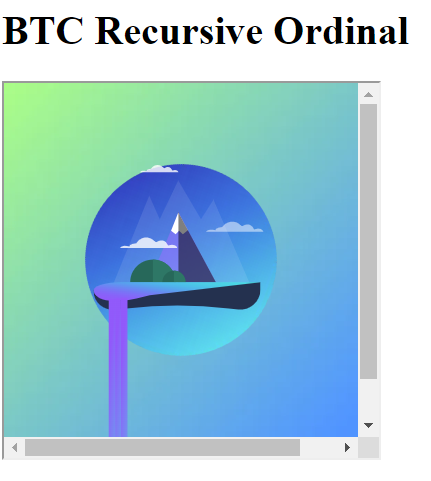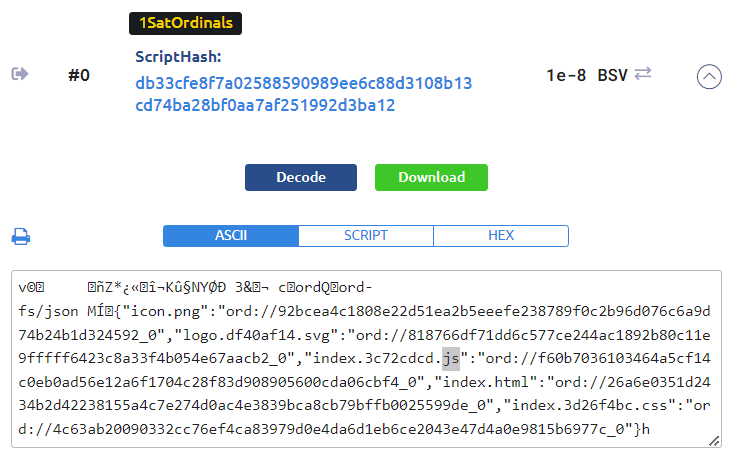|
Getting your Trinity Audio player ready...
|
David Case (@shruggr) has created a website that serves data inscribed on Ordinals from both BSV and BTC. At ordinals.shruggr.cloud, you can view files that exist on both chains. This is possible through the immutable hashes of transactions and files that, despite being across multiple blockchains, are still unique via SHA-256. This uniqueness allows for secure referencing from websites, and confidence that the file served is indeed the file being served and will not change.
💥Breaking News 💥@shruggr built the internet on Bitcoin.
Not just BTC, on BITCOIN.
This is not a drill.
The new internet is ordinals.
The new internet is immutable.
The new internet is now.
Follow @developingZack @shruggr @wildsatchmo and @kurtwuckertjr
For more. https://t.co/U883yiCkX4— Zack Wins (@DevelopingZack) June 30, 2023
shruggr linked a DNS TXT record to his domain, which indicated the Ordinal for his domain to serve as the HTML. The HTML itself references other inscribed files atop both chains. The top image on the site is a recursive Ordinal on BTC which references other inscriptions on BTC.

This image is actually three images overlayed atop each other, where the parent references the three via the BTC Ordinal.
7286fc9119a7630bad27f98459d81802ad2e100f78ba0ab993bbf0546ad9f730i0.
Background:

Circle:

Mountain:

The BSV Ordinal is also recursive, where it has Ordinal references to each part of the website, for example, icon, index.html, CSS, and JavaScript:

The ability to construct web pages from different immutable files enables creativity and new markets that were not possible before. As each element now exists separately for public use, one can pick and choose which pieces to construct. This enables creators to commoditize their images, HTML, CSS, or JavaScript instead of just the entire website.
Moreover, creators can pick and choose which pieces to construct unique combinations of sites adding another dimension to the market. Just as the BTC Ordinal combines three images to make a unique one, anyone could do the same.
shruggr and Luke Rohenaz (@wildsatchmo), pioneers of the 1 Sat Ordinals version of the viral token protocol created originally on BTC, joined a Twitter space just afterward to discuss this innovation. This concept revives the idea that Bitcoin can replace the Internet, via experimentation that started right after BSV and Bitcoin Cash forked in November 2018. In 2019, _unwriter created a Bitcoin browser named Bottle, where users navigated files uploaded to the BSV blockchain instead of the Internet via HTTP.
Other than the fractionalized markets aspect, the browsing experience is more robust and secure. For example, many articles, blog posts, and images are lost to no longer served content. These artifacts may not even exist on the Wayback Machine, as they may not have been captured, or be deliberately removed if enough of the new culture calls for it. Reading old forum posts from 2009 may not even be possible or riddled with broken links that the site may as well not be accessible.
In the literal sense, Bitcoin fixes this.
Not only does Bitcoin solve the Internet archival problem, but it solves the issue of the ability to monetize those old sites, posts, and images while at the same time fixing the incentive that allowed them to go offline in the first place. If owners can earn consistently from the content that they truly own, they are more likely to serve it in the future, and if they do not, someone else can buy the rights to serve themselves.
Another way the browser experience is improved is security. As shruggr pointed out on the Twitter space, if browsers are serving files via their hashes, HTTPS is no longer required. Requesters of the content can easily hash the file themselves and compare the hash to verify its legitimacy. Bitcoin may or may not replace the Internet, but it will definitely make it more secure, more of a market, and a much better user experience.
Watch Ty Everett: Users are going to see a better internet

 03-02-2026
03-02-2026 




